- Home
- Francis Spufford
Unapologetic Page 2
Unapologetic Read online
Page 2
A consolation you could believe in would be one that didn’t have to be kept apart from awkward areas of reality. One that didn’t depend on some more or less tacky fantasy about ourselves, and therefore one that wasn’t in danger of popping like a soap bubble upon contact with the ordinary truths about us, whatever they turned out to be, good and bad and indifferent. A consolation you could trust would be one that acknowledged the difficult stuff rather than being in flight from it, and then found you grounds for hope in spite of it, or even because of it, with your fingers firmly out of your ears, and all the sounds of the complicated world rushing in, undenied.
I remember a morning about fifteen years ago. It was a particularly bad morning, after a particularly bad night. We had been caught in one of those cyclical rows that reignite every time you think they’ve come to an exhausted close, because the thing that’s wrong won’t be left alone, won’t stay out of sight if you try to turn away from it. Over and over, between midnight and six, when we finally gave up and got up, we’d helplessly looped from tears, and the aftermath of tears, back into scratch-your-eyes-out scratch-each-other’s-skin-off quarrelling, each time with the intensity undiminished, because the bitterness of the betrayal in question (mine) was not diminishing. Intimacy had turned toxic: we knew, as we went around and around and around it, almost exactly what the other one was going to say, and even what they were going to think, and it only made things worse. It felt as if we were reduced – but truthfully reduced, reduced in accordance with the truth of the situation – to a pair of intermeshing routines, cogs with sharp teeth turning each other. When daylight came, the whole world seemed worn out. We got up, and she went to work. I went to a cafe – writer, you see, skivers the lot of us – and nursed my misery along with a cappuccino. I could not see any way out of sorrow that did not involve some obvious self-deception, some wishful lie about where we’d got to. (Where I’d got us to.) She wasn’t opposite me any more, but I was still grinding round our night-long circuit in my head. And then the person serving in the cafe put on a cassette: Mozart’s Clarinet Concerto, the middle movement, the Adagio.
If you don’t know it, it is a very patient piece of music. It too goes round and round, in its way, essentially playing the same tune again and again, on the clarinet alone and then with the orchestra, clarinet and then orchestra, lifting up the same unhurried lilt of solitary sound, and then backing it with a kind of messageless tenderness in deep waves, when the strings join in. It is not strained in any way. It does not sound as if Mozart is doing something he can only just manage, and it does not sound as if the music is struggling to lift a weight it can only just manage. Yet at the same time, it is not music that denies anything. It offers a strong, absolutely calm rejoicing, but it does not pretend there is no sorrow. On the contrary, it sounds as if it comes from a world where sorrow is perfectly ordinary, but still there is more to be said. I had heard it lots of times, but this time it felt to me like news. It said: everything you fear is true. And yet. And yet. Everything you have done wrong, you have really done wrong. And yet. And yet. The world is wider than you fear it is, wider than the repeating rigmaroles in your mind, and it has this in it, as truly as it contains your unhappiness. Shut up and listen, and let yourself count, just a little bit, on a calm that you do not have to be able to make for yourself, because here it is, freely offered. You are still deceiving yourself, said the music, if you don’t allow for the possibility of this. There is more going on here than what you deserve, or don’t deserve. There is this, as well. And it played the tune again, with all the cares in the world.
The novelist Richard Powers has written that the Clarinet Concerto sounds the way mercy would sound, and that’s exactly how I experienced it in 1997. ‘Mercy’, though, is one of those words that now requires definition. It does not only mean some tyrant’s capacity to suspend a punishment he has himself inflicted. It can mean – and does mean in this case – getting something kind instead of the sensible consequences of an action, or as well as the sensible consequences of an action. Getting something kind where you thought there’d only be consequences. It isn’t a question of some beetle-browed judge deciding not to punish you. It’s just as much a question of something better than you could have expected being slipped, stealthily, into a process that was running anyway. Mercy is—
But by now I would imagine that some of you reading this are feeling some indignation building up. I don’t know who you are, of course, my dear particular reader with this particular copy of the book in your particular hands, or what you think about religion. You may be an atheist with the light of combat in your eye, or a fellow-believer hoping for a persuasive account of what we share; you may be one of the large number of non-believers who are mildly, tolerantly curious about what faith can possibly feel like from the inside, in what seems to you to be a self-evidently post-religious world. Or you may fall into some different category altogether. I don’t know, and I hope you’ll excuse me if, in my urgent desire to talk back at some of the loudest and most frequent contemporary reactions to belief, I seem to be shoving you, when I say ‘you’, into company where you really don’t belong. In this case by ‘you’ I mean all of you who, as I start to wax eloquent about mercy, are surging metaphorically to your feet with the strong sensation that I just rushed past something important. (‘Skating fast over thin ice’, as Ralph Waldo Emerson put it.)
Fair enough: if I get to interrupt Mr Lennon, you certainly get to interrupt me. Wait a minute, wait a minute, you say; never mind how you’re defining mercy. What about the way you’re defining religion? That’s religion, listening to some Mozart in a cafe? You were experiencing what we in the world of unbelief like to call ‘an emotion’, an emotion induced by a form of artistic expression which, to say the least, is quite famous for inducing emotions. You were not receiving a signal from God, or whatever it is you were about to claim; you were getting, if anything, a signal from Mr Mozart, that well-known dead Austrian in a wig. I hope that isn’t your basis for religious faith, you say, because you’ve described nothing there that isn’t compatible with a completely naturalistic account of the universe, in which there’s nobody there to extend any magical mercy from the sky, just stuff, lots and lots of astonishing, sufficiently interesting stuff, all the way up from the quantum scale to the movement of galaxies.
Well, yes. By the same token, of course, what I’ve described is also completely compatible with a non-naturalistic account of the universe – but that’s not really the point, is it? The point is that from outside, belief looks like a series of ideas about the nature of the universe for which a truth-claim is being made, a set of propositions that you sign up to; and when actual believers don’t talk about their belief in this way, it looks like slipperiness, like a maddening evasion of the issue. If I say that, from inside, it makes much more sense to talk about belief as a characteristic set of feelings, or even as a habit, you will conclude that I am trying to wriggle out, or just possibly that I am not even interested in whether the crap I talk is true. I do, as a matter of fact, think that it is. For the record, I am not pulling the ultra-liberal, Anglican-going-on-atheist trick of saying that it’s all a beautiful and interesting metaphor, snore bore yawn, and that religious terms mean whatever I want them to mean. (Though I do reserve the right to assert that believers get a slightly bigger say in what faith means than unbelievers do. It is ours, after all. Come in, if you think you’re hard enough.) I am a fairly orthodox Christian. Every Sunday I say and do my best to mean the whole of the Creed, which is a series of propositions. No dancing about; no moving target, I promise. But it is still a mistake to suppose that it is assent to the propositions that makes you a believer. It is the feelings that are primary. I assent to the ideas because I have the feelings; I don’t have the feelings because I’ve assented to the ideas.
So to me, what I felt listening to Mozart in 1997 is not some wishy-washy metaphor for an idea I believe in, and it’s not a front behind which the real busines
s of belief is going on: it’s the thing itself. My belief is made of, built up from, sustained by, emotions like that. That’s what makes it real. I do, of course, also have an interpretation of what happened to me in the cafe which is just as much a scaffolding of ideas as any theologian or Richard Dawkins could desire. I think – note the verb ‘think’ – that I was not being targeted with a timely rendition of the Clarinet Concerto by a deity who micromanages the cosmos and causes all the events in it to happen (which would make said deity an immoral scumbag, considering the nature of many of those events). I think that Mozart, two centuries earlier, had succeeded in creating a beautiful and accurate report of an aspect of reality. I think that the reason reality is that way, is in some ultimate sense merciful as well as being a set of physical processes all running along on their own without hope of appeal, all the way up from quantum mechanics to the relative velocity of galaxies by way of ‘blundering, low and horridly cruel’ biology (Darwin), is that the universe is sustained by a continual and infinitely patient act of love. I think that love keeps it in being. I think that Dante’s cosmology was crap, but that he was right to say that it’s ‘love that moves the sun and all the other stars’.* I think that the universe is its own thing, integral, reliable, coherent, not Swiss-cheesed with irrationality or whimsical exceptions, and at the same time is never abandoned, not a single quark, proton, atom, molecule, cell, creature, continent, planet, star, cluster, galaxy, diverging metaversal timeline of it. I think that I don’t have to posit some corny interventionist prod from a meddling sky fairy to account for my merciful ability to notice things a little better, when God is continually present everywhere anyway, undemonstratively underlying all cafes, all cassettes, all composers; when God is ‘the ground of our being’, as St Paul puts it, or as the Qur’an says with a slightly alarming anatomical specificity, when God ‘is as close to you as the veins in your own neck’.
* I’ve made a little alteration here. Dante actually said ‘the sun and all the lesser stars’, at the end of the Paradiso, because he was under the impression that the sun was a fire orbiting the earth, and the stars were a collection of much smaller sparkly objects stuck to the inner shell of a rotating crystal sphere. Like I said, his cosmology was crap.
That’s what I think. But it’s all secondary. It all comes limping along behind my emotional assurance that there was mercy, and I felt it. And so the argument about whether the ideas are true or not, which is the argument that people mostly expect to have about religion, is also secondary for me. No, I can’t prove it. I don’t know that any of it is true. I don’t know if there’s a God. (And neither do you, and neither does Professor Dawkins, and neither does anybody. It isn’t the kind of thing you can know. It isn’t a knowable item.) But then, like every human being, I am not in the habit of entertaining only the emotions I can prove. I’d be an unrecognisable oddity if I did. Emotions can certainly be misleading: they can fool you into believing stuff that is definitely, demonstrably untrue. But emotions are also our indispensable tool for navigating, for feeling our way through, the much larger domain of stuff that isn’t susceptible to proof or disproof, that isn’t checkable against the physical universe.* We dream, hope, wonder, sorrow, rage, grieve, delight, surmise, joke, detest; we form such unprovable conjectures as novels or clarinet concertos; we imagine. And religion is just a part of that, in one sense. It’s just one form of imagining, absolutely functional, absolutely human-normal. It would seem perverse, on the face of it, to propose that this one particular manifestation of imagining should be treated as outrageous, should be excised if (which is doubtful) we can manage it.
* And isn’t ever going to be, either, no matter the progress of science. Science is not ever, for example, going to provide us with the basis to make secure judgements about such works of human imagination as justice or mercy. For an excellent discussion of this point, see Richard Dawkins’ explanation of his ‘anti-Darwinian’ political views in A Devil’s Chaplain.
But then, this is where the perception that religion is weird comes in. It’s got itself established in our culture, relatively recently, that the emotions involved in religious belief must be different from the ones involved in all the other kinds of continuous imagining, hoping, dreaming, etc., that humans do. These emotions must be alien, freakish, sad, embarrassing, humiliating, immature, pathetic. These emotions must be quite separate from commonsensical us. But they aren’t. The emotions that sustain religious belief are all, in fact, deeply ordinary and deeply recognisable to anybody who has ever made their way across the common ground of human experience as an adult. They are utterly familiar and utterly intelligible, and not only because the culture is still saturated with the spillage of Christianity, slopped out of the broken container of faith and soaked through everything. This is something more basic at work, an unmysterious consanguinity with the rest of experience.
It’s just that the emotions in question aren’t usually described in ordinary language, with no special vocabulary; aren’t usually talked about apart from their rationalisation into ideas. That’s what I shall do here. Ladies and gentlemen! A spectacle never before attempted on any stage! Before your very eyes, I shall build up from first principles the simple and unsurprising structure of faith. Nothing up my left sleeve, nothing up my right sleeve, except the entire material of everyday experience. No tricks, no traps, ladies and gentlemen; no misdirection and no cheap rhetoric. You can easily look up what Christians believe in. You can read any number of defences of Christian ideas. This, however, is a defence of Christian emotions – of their intelligibility, of their grown-up dignity. The book is called Unapologetic because it isn’t giving an ‘apologia’, the technical term for a defence of the ideas.
And also because I’m not sorry.
2
The Crack in Everything
One of the major obstacles to communicating what belief feels like is that I’m not working with a blank slate. Our culture is smudged over with half-legible religious scribbling. The vocabulary that used to describe religious emotions hasn’t gone away, or sunk into an obscurity from which you could carefully reintroduce it, giving a little explanation as each unfamiliar new/old term emerged. Instead, it’s still in circulation, but repurposed, with new meanings generated by new usages; meanings that make people think that they know what believers are talking about when they really, really don’t.
Case in point: the word ‘sin’, that well-known contemporary brand name for ice cream. And high-end chocolate truffles. And lingerie in which the colour red predominates. And sex toys; and cocktails. There’s a brand-management agency in Australia called Sin. There’s a fish restaurant in Lima, Peru, called Los Pescadores Capitales, which is a Spanish-language pun on the similarity between the words for sinning and for fishing. (An English equivalent would be The Seven Deadly Fins.) There used, God help us, to be a seaside panto for adults starring Jim Davidson which went by the name of Sinderella. Taxes on cigarettes and booze are ‘sin taxes’. Sin City, in Frank Miller’s comic book and the movie adaptation of it, is a locale where the population are entirely occupied in lap-dancing and extreme violence. Keep piling up the examples, and a picture emerges – meaning congealing from a pointillist cloud. It isn’t tidy, this definition-by-use, and the cloud of meaning clearly has a light end (truffles) and a noir end (Frank Miller) but it’s entirely comprehensible all the same.
‘Sin’, you can see, always refers to the pleasurable consumption of something. Also, it always preserves some connection to sex, which is why it would seem creepy for it ever to appear in the branding of a product aimed at children, and sometimes the sex is literal, but usually it’s been disembodied, reduced to a mere tinge of the amosphere of desire, and transferred from sex itself to another bodily satisfaction, to eating or drinking or smoking or greedy looking (all of which are easier to put on sale in bulk quantities than sex itself ). The other universal is that ‘sin’ always encodes a memory of ancient condemnation: but a distant memory, a ve
ry faint and inexplicable memory, just enough of a memory to add a zing of conscious naughtiness to whatever the pleasure in question is. Whether the thing you’re consuming is saturated fat spiked with mood-lifting theobromine (truffles again) or the spectacle of non-existent impulse control rendered in moody black and white (Frank Miller again), you kind of know you shouldn’t. But not in a serious way. The pleasure comes from committing an offence (against good nutrition or boring old good taste) which is too silly to worry about.

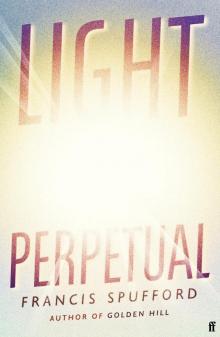 Light Perpetual
Light Perpetual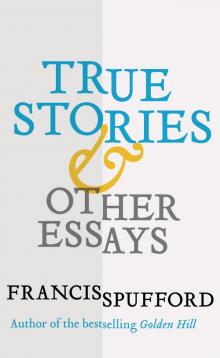 True Stories
True Stories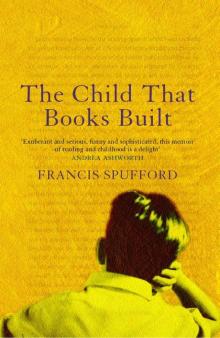 The Child that Books Built
The Child that Books Built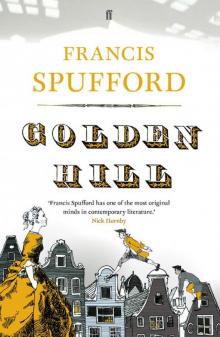 Golden Hill
Golden Hill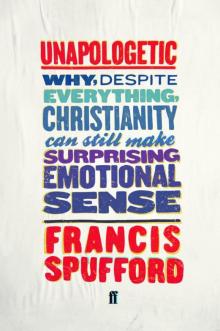 Unapologetic
Unapologetic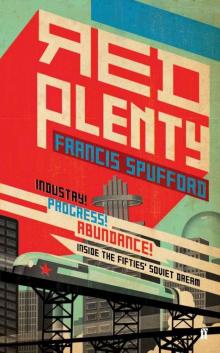 Red Plenty
Red Plenty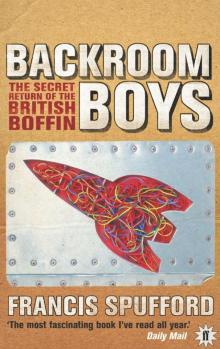 Backroom Boys
Backroom Boys